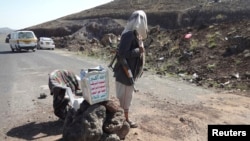SANAA —
At least 120 people were killed in northern Yemen on Monday in fighting between Shi'ite Muslim Houthi rebels and government forces before a ceasefire was agreed, a Yemeni official said on Tuesday.
Ahmed al-Bekry, deputy governor of Omran province, said that Yemeni war planes bombed positions held there by Houthi fighters and army forces clashed with the rebels, killing around 100 of them. He said about 20 government soldiers were killed as well.
He said fighting ended by Monday evening after the sides agreed a ceasefire and no clashes were reported on Tuesday.
“Things are calm [today] after mediation efforts led by the interior minister,” Bekry told Reuters, adding Yemeni air force action on Monday was one of the main reasons for the Houthis' assent to a truce.
Yemen has been in turmoil since 2011, when mass protests forced long-ruling president Ali Abdullah Saleh to step down.
As well as the fighting in Omran, where the Shi'ite tribal militia is trying to cement its control over the northern highlands, Yemen is facing a threat from al-Qaida and a challenge from separatists in the south.
Clashes have repeatedly erupted in the past months between government troops and Houthis - named after the Shi'ite tribe of its leaders - as Sanaa struggles to restore nationwide control.
The Houthis blame elements of the Sunni Muslim Islah party within government forces and in the Omran local administration for the fighting.
Government officials say the Houthis, who have repeatedly fought government forces since 2004, are trying to tighten their grip on the north before next year's election and as Yemen eyes moves towards a federal-style devolution of power to regions.
Ahmed al-Bekry, deputy governor of Omran province, said that Yemeni war planes bombed positions held there by Houthi fighters and army forces clashed with the rebels, killing around 100 of them. He said about 20 government soldiers were killed as well.
He said fighting ended by Monday evening after the sides agreed a ceasefire and no clashes were reported on Tuesday.
“Things are calm [today] after mediation efforts led by the interior minister,” Bekry told Reuters, adding Yemeni air force action on Monday was one of the main reasons for the Houthis' assent to a truce.
Yemen has been in turmoil since 2011, when mass protests forced long-ruling president Ali Abdullah Saleh to step down.
As well as the fighting in Omran, where the Shi'ite tribal militia is trying to cement its control over the northern highlands, Yemen is facing a threat from al-Qaida and a challenge from separatists in the south.
Clashes have repeatedly erupted in the past months between government troops and Houthis - named after the Shi'ite tribe of its leaders - as Sanaa struggles to restore nationwide control.
The Houthis blame elements of the Sunni Muslim Islah party within government forces and in the Omran local administration for the fighting.
Government officials say the Houthis, who have repeatedly fought government forces since 2004, are trying to tighten their grip on the north before next year's election and as Yemen eyes moves towards a federal-style devolution of power to regions.







